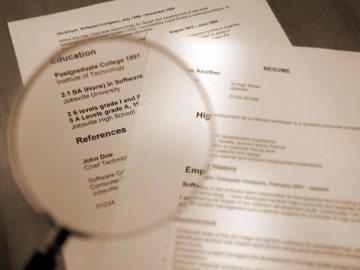Preparing a Resume: How to List Your Qualifications

First impressions matter a great deal when it comes to job hunting. The bearer of that first glance is your resume. One can't have a good resume if they don't feature the right qualifications for the job. Understanding how to list qualifications on your resume is critical to how employers see you.
The qualifications on your resume can differentiate you from the rest. Moreover, if the potential employer does decide to offer you the job, your resume qualifications section can easily influence the salary figure they'll settle on.
So, how do you start preparing a resume? You first need to list the right qualifications for your resume.
What Qualifications Should You List?
-
Experience
To get a job, you need experience. It's not only necessary to list your previous jobs, but it'll also help to write the timeline of your career from the most recent to the oldest.
-
Education
Education refers to the schools you've attended, the degrees you've earned, and even the short courses you've completed. This section gives the hiring manager an idea of what industry you might be most familiar with.
-
Projects
These may include client projects, creative projects, or any short ventures related to your career. Employers must see that you take part in tasks that enrich your skills.
-
Hard and soft skills
Hard skills are technical skills like UX design, teaching, or bookkeeping. Soft skills are more about human skills such as teamwork, time management, and critical thinking.
-
Licenses & certifications
Some qualifications for a resume aren't based on your educational background alone. Certifications and licenses are unique additions to your credentials in showing your field expertise. You may add your license and certificate number, including the organization that gave them.
-
Awards, recognitions, and acknowledgments
Hiring managers love winners. If you have achievements related to your field, list them when preparing a resume. Awards may just set you apart from the other candidates.
-
Leadership positions
Listing your leadership background will show employers that you aren't only a team player but also a potential leader in their company.
How to List Your Qualifications: 6 Helpful Tips
-
Keep it brief
It's great to have a long list of credentials. However, hiring managers read a pile of applications every day. Resumes are ideally one to two pages long, so keep them concise.
-
Show a rare skill set
You must stand out from the rest of the applicants by showing a rare skill set or expertise. An example is listing your versatile experience in a specific industry.
-
Make your top skills the most visible
When preparing a resume, identify the skills you're most proficient and confident about. Now place that at the top of the list. It'll show employers if your most significant strengths match their qualifications.
-
Include quantifiable data
Include numbers to quantify your experiences in past positions, such as the duration of a job position, your income, the scope of the budget you managed, or the number of employees you oversaw.
-
Write in active voice
A well-written document is often written in an active voice. Active voice is straightforward, easier to read, and more clearly stresses the qualifications for your resume. It also shows competent communication skills.
-
Use action verbs
Action verbs leave out the “I” in your statements. Since a resume must be brief and concise, action verbs can simplify your descriptions.
First Impressions Matter
Your resume will be a hiring manager's first impression of you. In a competitive job market, first impressions matter. You'll likely not be the only person to apply for the position, so you must ensure that you'll stand out from the pile of other job applicants.
The goal is to give the employer one glance and make them want to hear from you immediately. If you don't hear back, that's okay! A rejection may make way for the proper position for you. Find the right job for you at Career.com today.


